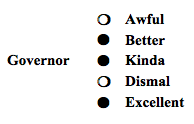|
Approval voting is very straightforward -- voters can vote for more than one candidate, particularly relevant in an election involving more than two candidates. Here's an example of a five-way race in which the voter will take anyone who isn't #1 or #4:
Advantage -- Approval Voting has one particular advantage over RCV: it can be hand counted. This means that -- like our current "Plurality Voting" -- it is scalable: large results are simply the additions of many smaller results. Thus, it can be independent of machines, and is thus advocated by some who are concerned about electronic manipulation of elections.
Limitations -- However, Approval Voting does have its limitations, which may in practice limit its ability to solve the problems at which RCV is aimed.
- Spoiler problem -- It does not solve the spoiler problem or the need for strategic voting. Voting for your second choice candidate can in some cases lead to the defeat of your favorite candidate. Though the problem is less severe than in plurality voting, it remains. For example, a campaign could urge their supporters -- quietly, at least -- to vote for their candidate only, thus reverting back to plurality voting. Approval voting is unlikely to work in practice as it is supposed to work in theory.
- Little preference -- Approval voting forces voters to cast equally weighted votes for candidates they approve of. Voters cannot indicate a strong preference for one candidate and a weak preference for another. Voters in fact almost always will have different degrees of support for different candidates. The indication of support for a lesser choice can help defeat a voter's most preferred candidate.
- Majority failure -- Approval voting violates our common sense understanding of majority rule and thus might encounter significant oppostion. Candidate A, with the first choice support of more than 50% of voters, can lose to Candidate B without a single first choice supporter if Candidate B gets enough lower choices.
- Usage -- RCV proponents claim that (a) Approval voting has not been used to elect single-winner offices at any level of government anywhere in the world, (b) RCV has been used in jurisdictions around the United States for years, and (c) RCV has been around the world for 100 years. I mention these here in the interests of fairness to RCV proponents -- I have not been able to verify (a) or (c), and it should be noted that some of the jurisdictions that have tried RCV have discontinued its use.
|
